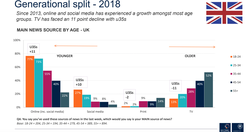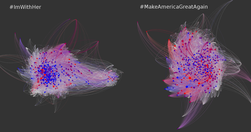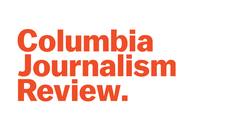Relevant Overviews
- Communication Strategy
- Content Strategy
- Online Strategy
- Online Community Management
- Social Media Strategy
- Content Creation & Marketing
- Online Architecture
- Digital Transformation
- Fediverse
- Innovation Strategy
- Surveillance Capitalism, Social media and Polarisation (Overview)
- Disinformation in the US 2020 elections
- Communications Tactics
- Psychology
- Social Web
- Media
- Politics
- Communications Strategy
- Science&Technology
- Business
Overview: Content Creation & Marketing
At the end of the day, you’ll need content.
It’s not enough to have a content strategy – you also need content, and you need to get it out there if you want it read. News articles, interviews, blog posts, in-depth explainers, web pages, press releases... all have their own specific form and goals, and all need to be promoted differently.
But it’s not just a question of text: you’ll need an array of content to explain your message and get it out there. A news article for your website, for example, needs not only an illustration for the article itself, but additional images and even short audiovisual to get traction on social media. And it will need to be accompanied by a variety of texts, which can be tested, refined and boosted in real-time.
Need help? Get in touch.
More services: start with Communication strategy.
Relevant resources

Fleeting Note (FN): the creation of Fediverse-based alternatives might suddenly become an urgency.

echo chambers and filter bubbles are slightly different... echo chambers could be a result of filtering or ... other processes, but filter bubbles have to be the result of algorithmic filtering...people main source of news roughly equal ... online and television... TV is more likely... people over 45. People under 45 are more likely to get their n…

In the US, radio began as a free-market free-for-all. More than five hundred radio stations sprang up in less than a decade to explore the possibilities... 40 percent were noncommercial... network of interlinked stations playing local and national content supported by local and national advertising, became dominant players...Soviet Union... ideolo…

“We wanted democracy... but got mobocracy.”... Bots generated one out of every five political messages posted on Twitter in America’s presidential campaign last year... “we need to reform our attention economy.”... groups which had mostly been excluded from the mainstream media... developed the dark arts they would use to further their agendas..…
our analysis shows that social media use is clearly associated with incidental exposure to additional sources of news ... with more politically diverse news diets... The algorithms, of course, continually change... More sources does not necessarily mean more diverse... the majority in most countries and in most groups do not use sources from a…

Fighting people with facts only makes them cling to their beliefs more strongly, further polarising our damaged societies. Different tactics are needed, and they start closer to home than you think.

In the United States... the chances that two people visiting the same news site have different political views is about 45 percent... the internet is far closer to perfect desegregation than perfect segregation... you are more likely to come across someone with opposing views online than you are offline... a surprising amount of the information …
I’ve been meaning to blog about the ‘backfire effect’ cognitive bias since first coming across it last December. It went to the top of my ToBlog list thanks to a little serendipity...

On fully eight of the nine measures, “polarization increases more for the old than the young.” If Facebook is the problem, then how come the problem is worst among those who don’t use Facebook? ... polarization is accelerating fastest among those using the internet the least... social media is important. It’s just not the whole picture... two mai…

everyone is intransigent now ... Social media acts as a massive collective Sorting Hat, silently assigning most of us to filter bubbles wherein our beliefs and biases are rarely challenged. News (or “news”) sources rise up to cater... slowly, these isolated groups do what isolated groups do... become more extreme. Increasing extremity in one group…

when I saw the potential of the Internet, I thought it would be solved. The web would allow us to come together, not just across the world, but across the park, across racial lines, across our many divides... everything turned upside down. The open communication network we thought we were building turned into a hunting ground for trolls and spamme…

my research team’s analysis of data from Columbia University’s Emergent rumor tracker suggests that this misinformation is just as likely to go viral as reliable information... limiting news fakers’ ability to sell ads... a step in the right direction. But it will not curb abuses driven by political motives... Using BotOrNot, our colleagues found…

Perfectly open communities always go sour. You need filters. Every functional community has them. And that’s where machine learning comes in... If you can detect trolls, you can protect the people they’re trolling by muting or putting a warning over the trolls’ posts... Twitter... already have a way of screening out porn. Why don’t they do the sam…

many of us have burrowed into our own echo chambers of information. In a recent Pew Research Center survey, 81 percent of respondents said that partisans not only differed about policies, but also about “basic facts.”... if you study the dynamics of how information moves online today, pretty much everything conspires against truth... when confron…

Two convergent trends are making populism a potent negative force. First, democracies have morphed into unrepresentative plutocracies that lead growing numbers of people to feel shut out and voiceless... Media ... business model is now based on social media and clicks, not facts. Clicks depend on theatrical performance, stunts, celebrity, ent…
Segregated social universes, an industry moving from red states to the coasts, and mass media’s revenue decline: The disconnect between two realities shows no sign of abating... American political discourse in 2016 seemed to be running on two self-contained, never-overlapping sets of information... today’s media ecosystem encourage that separatio…

with newsrooms reeling... a weakening of the stable platforms threatens to cause general informational impoverishment, a degradation of the entire information ecosystem. Adding to the worry, people today are exposed to news ... through a single platform—mainly social networks, which tend toward a clustering of like-minded individuals. Together,…

a research paper ... found depressing proof that the web is fuelling segregation.... matched the attitudes of those who did and did not have broadband with data on partisan hostility... Greater use of the web ensured that an admirer of Jon Stewart would think that conservatives were not just mistaken but stupid, or a viewer of Fox News would wor…

image... apparently shows the spread of radiation from the Fukushima nuclear accident... being shared widely ... despite the fact that it... shows the wave height of the tsunami... you might want to doublecheck before hitting Share... here’s how

Brexit, as experienced by a British-Australian comms guy in Brussels.
This isn’t the first time I’ve covered the impact of social media on news; technologies like augmented reality; and the impact of both on society. It is the first time these Top3ics have meshed so perfectly in one month.
In which I studiously avoid curating anything about 2016 or David Bowie.

It’s easy to underestimate how much of the media you’ve consumed was shaped by the “like” button... whispers suggest that the company is not, in fact, launching a simple “dislike” button, but something that conveys empathy.... it’s safe to say there will be consequences... When Facebook broadens the scope of the emotional-response buttons, t…
Blogging has never been easier but getting read has never been harder... The problem isn't freedom or openness but distribution... you might post it on Facebook or Google Plus. Your friends might see it ... (though this is largely random) and they might share it ... You might post it on LinkedIn and your network might see it ... and LinkedIn migh…
My first subscribers, surveyed last week, were equally split between the diverse formats and styles of my first four editions, so here’s a 5th.

IN RESPONSE TO The Web We Have to Save... Unlike a blogger, it’s very hard to isolate and ban Facebook or Twitter. A blogger can be placed in jail, a network of people on a platform with millions of users is much harder... [BUT] these platforms have their own censorship mechanisms... Facebook is doing better now but ... many things were bloc…

The rich, diverse, free web that I loved - and spent years in an Iranian jail for - is dying.Why is nobody stopping it?... The hyperlink was my currency six years ago... represented the open, interconnected spirit of the world wide web ... a way to abandon centralization ... and replace them with something more distributed, a system of nodes an…

How much more could Google News be? See "... a presentation that a German designer came up with that involved a wholesale redesign and re-thinking of what Google News is and does." Lots of good stuff here. Particularly like how 'smart personalisation' is used to help penetrate the filter bubble: "automatically suggest related stories on a news t…

"Facebook seems to be trying to get more transparent about how the algorithms ... function, with a statement on Monday about cracking down on “clickbait.” ... But despite the attempts at openness, the bottom line remains the same: Facebook is a black box. No one really has any clue why the site chooses to show or hide certain content... what com…
"The Filter Bubble", by MoveOn.org foreign policy director Eli Pariser, shows that the forces creating the Brussels Bubble are about to be reinforced by technology, operated invisibly - and with impunity - by a handful of companies.
Relevant Overviews
- Communication Strategy
- Content Strategy
- Online Strategy
- Online Community Management
- Social Media Strategy
- Content Creation & Marketing
- Online Architecture
- Digital Transformation
- Fediverse
- Innovation Strategy
- Surveillance Capitalism, Social media and Polarisation (Overview)
- Disinformation in the US 2020 elections
- Communications Tactics
- Psychology
- Social Web
- Media
- Politics
- Communications Strategy
- Science&Technology
- Business